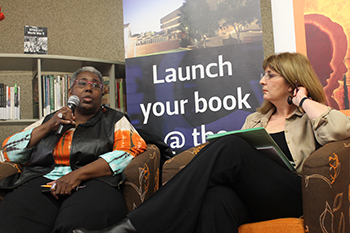Latest News Archive
Please select Category, Year, and then Month to display items
08 May 2024
|
Story Anthony Mthembu
|
Photo SUPPLIED
 From left to right: Prof Philippe Burger, Dean of the Faculty of Economic and Management Sciences (EMS) at the University of the Free State (UFS), presenting an award to Ntswaki Moshwaisi.
From left to right: Prof Philippe Burger, Dean of the Faculty of Economic and Management Sciences (EMS) at the University of the Free State (UFS), presenting an award to Ntswaki Moshwaisi.
A cohort of esteemed academic and support staff from the Faculty of Economic and Management Sciences (EMS) at the University of the Free State (UFS), received well-deserved accolades at the 2024 annual EMS Awards. Notable among them were Programme Coordinator Ntswaki Moshwaisi and Associate Professor Prof Liezel Massyn from the UFS Business School.
Prof Massyn was lauded in the Teaching and Learning category, while Moshwaisi garnered recognition in the Support Staff category at the awards ceremony held on 18 April 2024, on the UFS Bloemfontein campus.
Reflecting on her achievement, Moshwaisi expressed gratitude, stating, “The award serves as motivation to myself to keep working hard and to innovate methods and approaches towards my work.’’
The significance of the awards
Prof Massyn remarked that the awards serve to spotlight the remarkable contributions of both academics and support staff within the faculty. She considers the award as a testament to her dedication, acknowledged by her esteemed colleagues. Both Prof Massyn and Moshwaisi attribute their success to the support they receive from their peers.
Moreover, they emphasise that these awards transcend mere recognition. It will serve as an impetus to the way forward. Moshwaisi envisages leveraging her award to enhance the quality and efficacy of the programmes under her stewardship. Prof Massyn, echoing this statement, asserts, ’’It will strengthen my belief in the transformative power of teaching and make me work harder to provide quality learning opportunities to students. I am a firm believer in following an evidence-based approach and will continue to research learning and teaching.’’
Africa’s lost voice during the Second World War echoes throughout book
2016-08-24

Prof Judith Byfield and Prof Heidi Hudson at the
book launch of Africa and Second World War at the
UFS Sasol Library.
Photo: Rulanzen Martin
If you pick up any historical record on the Second World War, you would see that, to a large extent, Africa has been missing from the history pages until now.
Africa and the Second World War (WW II) is a book edited by Prof Carolyn Brown from Rutgers University and Prof Judith Byfield from Cornell University in the United States. The book is the outcome of various papers presented during a workshop at Rutgers University and at a conference on WWII hosted at Cornell University.
The co-editors of the book were invited by Prof Jonathan Jansen, Vice-Chancellor and Rector of the University of the Free State (UFS), to launch the book at the UFS. The Centre for Africa Studies at the university, in collaboration with the UFS Sasol Library, presented the launch on Tuesday 16 August 2016.
Bestowing honour upon Africa’s role during WW II
Many people do not know that WW II started in Ethiopia with the Italian Invasion. This is generally omitted from discussions or complete histories of WW II. The present book explores the experiences of male and female combatants, peasant producers, women traders, missionaries, and sex workers during the war. “Many people are not aware that Africa produced most of the mineral and agricultural during the war,” said Prof Brown.
Book to reach a greater audience for discussion
The co-editors hope that the book reaches people who teach WW II history, as many talk about only the nationalist movements. “The opening of the book also talks about the importance of South Africa during WW II,” said Prof Byfield. The authors hope that people will read the book to start thinking comparatively about the war.